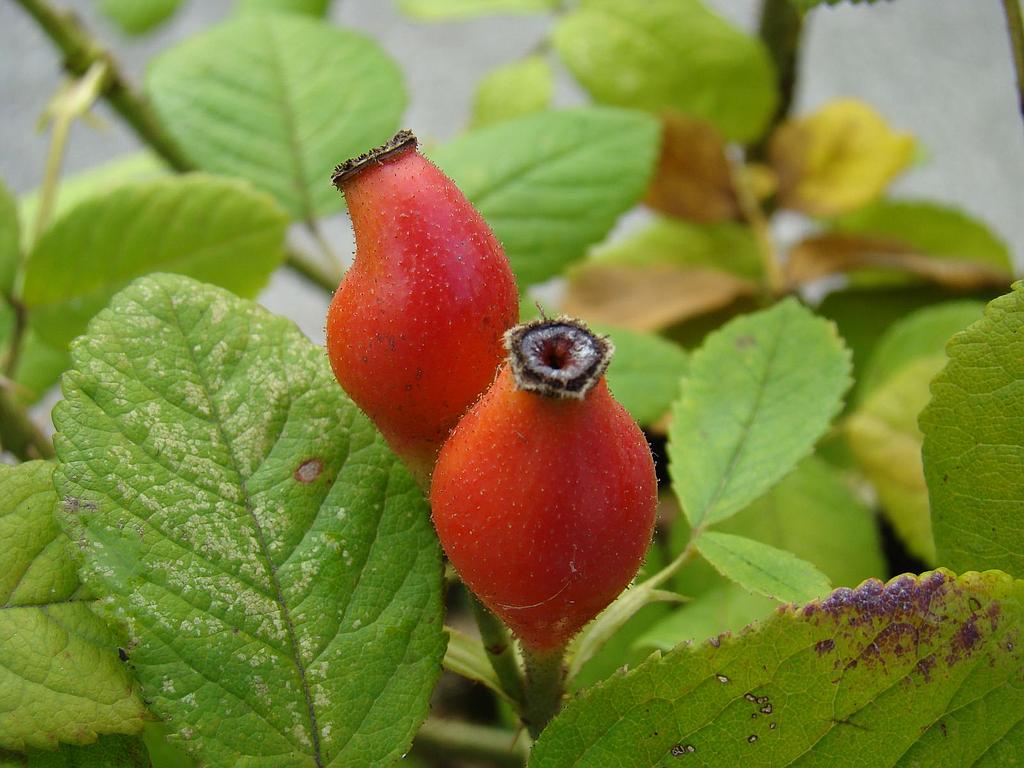Officinalis
R. gallica officinalis, ApothekersroosLarge semi-double, scented purple-carmine flowers showing their yellow stamens. An upright low shrub with dark green matt leaves. Widely cultivated from the 13th to the 19th century in the region of Provins (FR) for making medicines and fragrances.
- Bijenplant
- Snijbloem
- Standplaats: Possible in partial shade (>3u sun)
- Plantafstand: 90cm
- Vorstbestendigd: lager dan -15°C
The Apothecary's rose is still a classic among the old gallica roses.
The flowers are single or in small clusters. They are large, semi-double and have a colour varying between deep pink and purple-red with striking yellow stamens. They have a light scent. This rose blooms once, for four weeks in June-July.
The branches have narrow soft hairy thorns with a few larger thorns.
The Apothecary's rose is an upright shrub that remains low, up to 100 cm-120 cm. This makes it ideal for the front of the border, in groups, as a hedge. Because of its medicinal use in the Middle Ages, it is also often planted in modern herb gardens.
The rose 'Officinalis' has many synonyms: Rosa gallica officinalis, Rosa rubra, 'Red Rose of Lancaster' 'Rose de Provins', 'Apothecary's rose', Rosa gallica 'Plena'. Rosa 'Officinalis' comes from the wild rose Rosa gallica.
The crusader Thibault IV, king of Navarra and count of Champagne-en-Brie, is said to have brought the wild Rosa gallica back from the 7th Crusade in 1250 and planted it at his castle in Provins. This is said to have later given rise to the 'Officinalis'. For several centuries it was grown en masse in the region around Provins, until the beginning of the 20th century. The petals were used for medicinal purposes and fragrances.
This rose also became the symbol of 3 English kings of the House of Lancaster. They carried this red rose in their shield.
The following line of poetry from the 15th century refers to the Wars of the Roses:
In the battle for England's head
York was white, Lancaster red
The Apothecary's rose is still a classic among the old gallica roses.
The flowers are single or in small clusters. They are large, semi-double and have a colour varying between deep pink and purple-red with striking yellow stamens. They have a light scent. This rose blooms once, for four weeks in June-July.
The branches have narrow soft hairy thorns with a few larger thorns.
The Apothecary's rose is an upright shrub that remains low, up to 100 cm-120 cm. This makes it ideal for the front of the border, in groups, as a hedge. Because of its medicinal use in the Middle Ages, it is also often planted in modern herb gardens.
The rose 'Officinalis' has many synonyms: Rosa gallica officinalis, Rosa rubra, 'Red Rose of Lancaster' 'Rose de Provins', 'Apothecary's rose', Rosa gallica 'Plena'. Rosa 'Officinalis' comes from the wild rose Rosa gallica.
The crusader Thibault IV, king of Navarra and count of Champagne-en-Brie, is said to have brought the wild Rosa gallica back from the 7th Crusade in 1250 and planted it at his castle in Provins. This is said to have later given rise to the 'Officinalis'. For several centuries it was grown en masse in the region around Provins, until the beginning of the 20th century. The petals were used for medicinal purposes and fragrances.
This rose also became the symbol of 3 English kings of the House of Lancaster. They carried this red rose in their shield.
The following line of poetry from the 15th century refers to the Wars of the Roses:
In the battle for England's head
York was white, Lancaster red
- Bijenplant
- Snijbloem
- Standplaats: Possible in partial shade (>3u sun)
- Plantafstand: 90cm
- Vorstbestendigd: lager dan -15°C
Alternative plants:
Our Selections
Recently viewed:
Order on our website, by mail or phone
We are happy to help you



